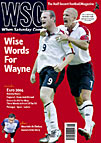 However unjust their elimination from Euro 2004 might have seemed at the time, the truth is that England will never go further than the last eight in a major tournament until there is a major rehaul of the Premiership
However unjust their elimination from Euro 2004 might have seemed at the time, the truth is that England will never go further than the last eight in a major tournament until there is a major rehaul of the Premiership
England’s elimination at Euro 2004 felt like a compilation of all their previous tournament crises. The team tend to rely on survival through attrition, of desperate defending with their “tin hats on”. But that never pays off, so other reasons for failure are found, often involving making a scapegoat of a referee (Urs Meier this year, Kim Milton Nielsen in 1998). This means uncomfortable questions don’t have to be posed, such as whether it’s right to place faith in star names when they are playing as badly as David Beckham, or indeed whether the best English players are in fact especially good in the first place.
The over-reliance on senior players is not a new thing – it is also a part of the enduring “barrack room” hierarchy of the dressing room. English football is overly impressed by seniority, by players being “skipper” or “the guv’nor”. Against England Luiz Felipe Scolari replaced Luís Figo with – of all people – Helder Postiga, who scored the equaliser. An England coach (and Sven, much as the Daily Mail would hate to acknowledge it, is extremely English) would never have done this. People still talk in shocked tones about Graham Taylor substituting Gary Lineker against Sweden at Euro 92 even though they were going out at the time. Beckham should have come off against Portugal, but the press would have torn into Eriksson rather than going on about the referee after they had lost.
The way domestic football is played continues to be a major hindrance to the national team. At their clubs England players play in an overly fast physical style, which is encouraged by both the constant blaring hype surrounding “the most exciting league in the world” and by what they hear around them on matchdays. Many English spectators react badly to patient football (“Get rid of it!” is one of the most commonly heard shouts from the crowd at any level here). Supporters like the frantic randomness, the possession changing hands all the time.
Compared to other countries, more English league goals result from defenders’ mistakes rather than creativity. It’s not just a question of English players’ technique not being as good as many of their international opponents – they are also not encouraged to think on the pitch. However much work Eriksson does on the training ground, it is difficult for him to change ingrained attitudes.
It doesn’t help that the wealth of the Premiership confers superstar status on so many. Delusions are encouraged by the way footballers are promoted as individual sportsmen, like tennis players or athletes, rather than members of a team. A truly great player will maintain the same desire to win no matter how wealthy and fêted they might be. But there aren’t many of those around. The question of whether the desire/effort/ desperation/psychotic dedication it takes to be the very best is dissipated by making somebody so rich they need never work again seems to be totally obvious: of course it is. Kieron Dyer, for example, recently seen on television debating whether to add to his collection of sports cars, would surely have had a more successful and focused career if he wasn’t unbelievably wealthy by the age of 25.
In some cases, players are made to look better than they really are at club level by their foreign team-mates. These days, first-choice England players are anyone who can actually get in the first teams of Man Utd, Arsenal, Chelsea and Liverpool; second choice is the best of the rest in the mini-league below the Champions League places. The talent pool has shrunk considerably. Young English players who in past generations would have worked their way through to the first team at top clubs now drop down the divisions or go out on loan.
Arsenal’s David Bentley has been a star of his age group for England at every level so far, including Under-21. But he has been loaned to Norwich because there’s no chance of him getting in the first team at Highbury. In times past the club would have worked with what it had and given him a run in the first team, as happened with George Graham’s young generation. The Scholes, Neville, Butt crop at Man Utd looked extremely green and out of their depth playing in Europe in the mid-1990s. For reasons of finance and faith they were given an extended chance and improved dramatically. They might not have got that chance now and could well have slipped away.
The Premiership with all its attendant hoopla can’t by its current nature provide a national team able to win or come close to winning major competitions against opponents who are technically and tactically superior. Going out at some point in the knockout stage may be England’s lot in perpetuity, unless there is a radical overhaul of our football values. And is there the will to do that?
From WSC 210 August 2004. What was happening this month